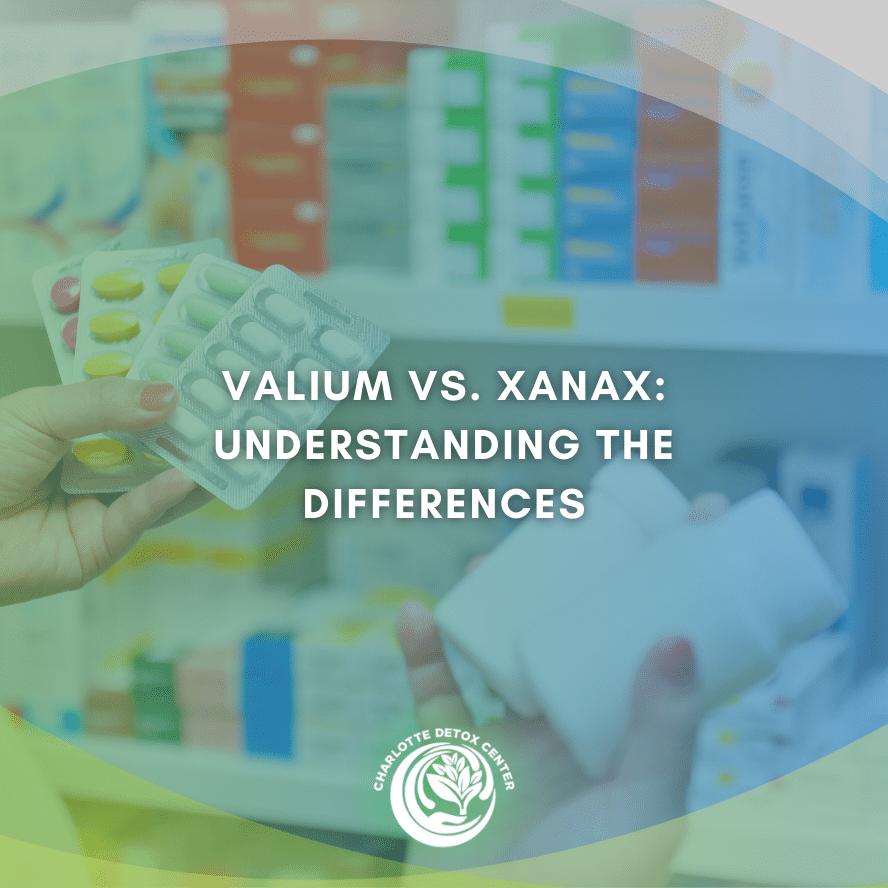Valium vs. Xanax: Understanding the Differences

Medically Verified: 2/1/24
Medical Reviewer
Chief Editor

All of the information on this page has been reviewed and verified by a certified addiction professional.
Benzodiazepines are a class of prescription medications that slow down activity in your central nervous system. These substances are often prescribed to treat anxiety, panic, insomnia, and certain seizure disorders. While benzodiazepines are effective in treating various conditions, they are also known to be highly addictive.
Benzodiazepine abuse is extremely common and experts estimate that 17.2% of people who use benzodiazepines are abusing them.[1]
Two of the most popularly abused benzodiazepines are Valium and Xanax. While these medications have plenty of similarities, there are also some differences to be aware of.
What is Valium (Diazepam)?
Valium is the brand name for a benzodiazepine called diazepam. Diazepam is most commonly used to treat anxiety and panic disorders. However, it might also be prescribed to treat seizures, muscle spasms, and twitches, or help in the alcohol withdrawal process.
Diazepam may cause a variety of side effects, including:[2]
- Dizziness or drowsiness
- Tiredness
- Muscle weakness
- Headaches
- Dry mouth
- Nausea or vomiting
- Constipation or diarrhea
- Confusion
- Difficulty urinating or frequent urination
- Changes in sex drive or ability
In addition to these side effects, using diazepam long-term can lead to dependency or addiction. As a result, doctors only prescribe Valium for short periods. can be dangerous, so you should never stop taking it without talking to your doctor.
What is Xanax (Alprazolam)?
Xanax is the brand name for alprazolam, a benzodiazepine drug that is used to treat anxiety and panic disorders by decreasing abnormal excitement in the brain. While Xanax is effective for treating anxiety, it can cause addiction if used long-term.
Other side effects of Xanax include:[3]
- Drowsiness, dizziness, or lightheadedness
- Headaches
- Tiredness or fatigue
- Irritability
- Talkativeness
- Trouble concentrating
- Dry mouth or increased salivation
- Changes in sex drive or ability
- Nausea and vomiting
- Constipation
- Changes in appetite and weight
- Difficulty urinating
- Joint pain
Since Xanax is addictive, doctors won’t prescribe it for long-term use. Additionally, most people take Xanax situationally or as needed, so they are not using it around-the-clock–only when they are experiencing severe anxiety or panic attacks.
after regular use can be dangerous and even life-threatening due to the potential for withdrawal seizures. Speak with your doctor or a detox center before stopping Xanax or any other benzodiazepine.
What Medications Are Similar to Xanax and Valium?
The main similarity between Xanax and Valium is that they belong to the same class of drugs: benzodiazepines. They are also very similar to a variety of other benzodiazepine medications, including:
- Clonazepam (Klonopin)
- Clorazepate (Tranxene)
- Chlordiazepoxide (Librium)
- Temazepam (Restoril)
- Estazolam (ProSom)
- Midazolam (Versed)
- Oxazepam (Serax)
- Flurazepam (Dalmane)
- Triazolam (Halcion)
- Quazepam (Doral)
Most of these drugs are used to treat the same conditions, such as anxiety, panic disorder, insomnia, and even alcohol withdrawal. All benzodiazepines affect the central nervous system by slowing down activity in that area of the brain. By slowing down this activity, people experience relaxation and calmness.
The Main Differences Between Xanax and Valium
The main difference is the dosage people can take. For example, the starting dosage for Valium is 0.25mg, while Xanax treatment starts at 2mg. Additionally, the daily limit for diazepam is 10mg per day, while people can take up to 40mg of Xanax.
Additionally, diazepam only comes in oral formulations. On the other hand, alprazolam can be used orally, intramuscularly, intravenously, and even in a rectal gel. Even further, Xanax is used to treat more conditions than diazepam is, as this medication is typically only prescribed for anxiety.
Lastly, diazepam is a long-acting benzodiazepine while alprazolam is short-acting. This means that it takes longer for than Xanax does.[4]
Are Diazepam and Alprazolam Addictive?
Every benzodiazepine is considered to be habit-forming or addictive. Someone can form a dependency on Valium or Xanax even if they are not abusing the drug. The longer you take the substance, the more likely you are to form a habit.
If you begin using Xanax or Valium in a manner that is not intended, you will form an addiction. Signs of benzodiazepine addiction include:
- Taking more than prescribed
- Stealing pills from a family member or friend
- Going to multiple doctors to receive more than one prescription (doctor shopping)
- Social isolation
- Spending a lot of time thinking about, using, or recovering from the use of Valium or Xanax
- Using drugs to cope with uncomfortable feelings or emotions
- Experiencing symptoms of withdrawal when you cannot take Valium or Xanax
- Dealing with uncontrollable urges to use benzodiazepines
If you or a loved one experience any of the above-mentioned symptoms of benzodiazepine addiction, it’s time to consider professional treatment. Abuse of substances like Xanax or Valium can lead to a variety of long-term consequences.
Finding Help for Xanax or Valium Abuse
If you or a loved one frequently abuse Xanax or Valium, you might be suffering from a benzodiazepine addiction. Addiction should always be taken seriously and treated by a benzodiazepine detox and treatment program.
To learn more about your treatment options, contact Charlotte Detox Center today.
References:
- The National Library of Medicine: Benzodiazepine Use and Misuse, Retrieved June 2023 From https://pubmed.ncbi.nlm.nih.gov/30554562/
- Medline Plus: Diazepam (Valium), Retrieved June 2023 From https://medlineplus.gov/druginfo/meds/a682047.html
- Medline Plus: Alprazolam, Retrieved June 2023 From https://medlineplus.gov/druginfo/meds/a684001.html
- Alcohol and Drug Foundation (ADF): Benzodiazepines, Retrieved June 2023 From https://adf.org.au/drug-facts/benzodiazepines/
